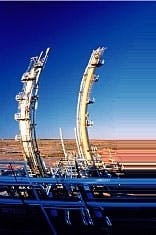Petroleum's brave new world
O, wonder!
How many goodly creatures are there here!
How beauteous mankind is! O brave new world,
That has such people in it!
William Shakespeare, The Tempest
With apologies to Shakespeare (and Aldous Huxley),"brave new world" is an apt way to try to describe the shape and form of the global petroleum industry in the 21st century.
But it is always risky to try to predict the future. So it follows that it was no small act of bravery for Oil & Gas Journal to undertake this challenge-in the process taking a breather from the usual weekly offering of petroleum news and technology that has made OGJ the bible of the oil and gas industry for almost a century.
SF vs. seers
Imagining the myriad future paths that might await humanity has always been the province of seers and science fiction writers. Even if viewed purely for entertainment value, however, what separates the seriously regarded (Arthur C. Clarke) from the silly (Nostradamus) is that work such as Clarke's has always been rooted in firm science or at least in a reasonable extrapolation of the knowable.
The approach of the new millennium tends to make seers and SF writers of us all, as we seek to put shape and form to our collective and individual futures. The best efforts, like the best SF, are rooted in reasonable extrapolations of current knowledge. So we have gathered here a collection of articles, written at our request by petroleum industry executives, analysts, consultants, and OGJ editors, that seeks to do just that. Even in seeking to divine from the entrails of this massive, unruly beast that is the petroleum industry today just what the future holds, OGJ still hews to its editorial mission: to present information and technology that readers can use in their jobs.
Throughout this issue, we also offer collections of the great milestones that have marked the path of the petroleum industry. Please don't think of them as argument-enders; we would not be so presumptuous. If anything, they will serve as argument-starters, and we welcome that process, for it helps us all reflect on the roots of that reasonable extrapolation to come.
Will it be a future that any of us recognizes? In some respects, yes; in other, even fundamental ways, no.
Change a constant
Even as the constituent segments of this industry will continue, for many years to come, to go about their business of exploring for, drilling, producing, transporting, processing, and marketing hydrocarbons, change will continue to be a constant in this industry.
What will mark the future in a radical way is that such change is likely to accelerate at an exponentially faster rate than ever before. Even now, change around us occurs with seemingly blinding speed-so abrupt and so overwhelming that an exercise such as this special edition becomes almost a necessity, allowing us to take a moment to catch our breath and take stock of where we have been and we are going.
The last time OGJ undertook a special edition of a comparable nature was Petroleum 2000, published on our 75th anniversary in 1977. It was a highly entertaining and instructive exercise for this editor to consider the articles in that 22-year-old volume in the context of what has come to pass. Especially noteworthy among those articles was a lack of awareness of the most dramatic change-still under way-that was to come: the degree to which the computer would revolutionize this industry.
This issue's cover image, rendered by artist Mike Reeder, offers a stylized representation of what in the future might be: a driller's workstation, a refinery operator's control room, or the cubicle of a gas pipeline's futures trader-all testimony to the central role of the computer today and tomorrow. It also has the feel of the cockpit of some interstellar ship, suggesting the petroleum industry is poised to take the next great leap into the unknown.
It has been said that virtually all of the great quantum leaps in scientific thought have been made and that all future changes in scientific thought will be incremental, not exponential. But the influence of the computer on this industry-indeed, all of humanity-has been both. In many ways large and small, the computer has revolutionized this industry, introducing new efficiencies and greater capabilities to rejuvenate an industry that not long ago was deemed to be in its sunset years. In a larger sense, however, the very structure of the petroleum industry is changing as advances in computer technology spur the men and women who work in it to redefine their work flow processes in step-change terms. The Oil & Gas Journal itself is no exception, as the staff finds itself astraddle a wildly bucking mount of change in their roles as gatherers and purveyors of information coping with new media, new organizational paradigms, and a new breed of readers. OGJ Editor Bob Tippee touches upon this and OGJ's connections to the past as well as to the future in the essay that closes this special issue. Looking at ourselves in an historical context helps us define who and what we are today.
The next sea change
Just as OGJ staffers grapple with a definition of self amid monumental change, so too must the petroleum industry. Herein lies the next sea change.
Among the articles in this issue are views that suggest that the petroleum industry as we know it today might become extinct because of some confluence of market factors that spurs consumers to reject it, or some environmental crisis pointing to it as a bogeyman, or some wondrous new energy source that renders it outmoded.
But a glance at the table featuring the top 100 petroleum industry milestones shows that market vagaries, environmental alarmism, and energy alternatives have always been with us and will continue to be with us for the foreseeable future.
Still, it is not unreasonable to extrapolate-especially in view of the stunning rapidity of change today-that the petroleum industry as we define it today might well become extinct. Certainly the Age of Petroleum is far from over. But the distant horizon-perhaps the 22nd century, perhaps sooner-beckons with something new and different: a cost-effective, hydrogen-based transportation fuel; cold fusion-generated electrical power; cheap agrochemical plastics that outperform petrochemicals and are themselves foodstuffs, etc. The Age of Petroleum is likely to be around-if society doesn't succumb to bogeymen characterizations and Chicken Little hypotheses-long enough to bridge the gap between now and then.
But the industry that has come to dominate the world during that age will be one that is different in form and function in ways we would be hard-pressed to recognize. We are seeing signs of this even now, with the "BTU convergence" trend. Traditional stalwarts of the petroleum industry, from producers to pipelines, are beginning to think of themselves less as commodity providers and more as value-added service providers. The day is virtually at hand when a consumer might buy all kinds of commodities and services, from gas and power to telecommunications and internet services, from a brand name that a consumer now recognizes only from a gasoline pump-and all of that accomplished via e-commerce.
It is more than a diversification that is coming. This is not another foray into a trendy new field, such as synthetic fuels was in the early 1980s; nor is it merely a diversification into some distaff industry as a hedge against the oil price cycles. This represents a fundamental redefinition of self, a rethinking of the primal order of things for an industry that has been one of the pivot points of modern civilization. A number of trends is propelling this basic self-reassessment by the industry: intensifying competition with new players and new rules in an increasingly transparent and low-margin market, the growing ubiquity of the internet and e-commerce, globalization and the rise of a new middle class in the developing world, the increasingly important role of stakeholder relations and social justice in industry operations-the list goes on.
Let this, then, stand as the first milestone of the petroleum industry in the 21st century at the next opportunity to tally such things: At the turn of the millennium in 2000, the petroleum industry acknowledges its passing-and celebrates its resurrection in a new guise.
And, although you may not recognize us either, OGJ also plans to be there.






